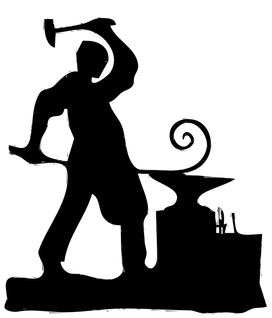
Change isn’t always good news, the recent trend of internet shopping is now closing local shops and losing local jobs. However, catalogue sales were once upon a time, the only shopping centres that people in remote areas had in North America. So maybe internet shopping is just the new catalogue. Perhaps in going forward we’re returning to the past.
Anyway, what happened to the blacksmiths? Did they just disappear from the face of the earth? Were they swallowed en masse by a black hole? After all, weren’t blacksmiths magical? The workers of iron were often seen as magicians, and only escaped the witch hunts of the Middle Ages because they were so very useful. So maybe a fairy queen took them all off to some Seelie court… only fairies don’t like wrought iron.
But seriously, what happened to the blacksmiths when cars started rolling down the roads of the world replacing horses? Well, my great grandfather was a blacksmith. I know what happened to him, he built cars. In 1910 he moved his family from Scotland to Canada, and became a machinist for a car manufacturer in Amherst, Nova Scotia. And apparently, he wasn’t the only one. This occurred to me as I was watching a documentary on an early car manufacturer, and for their first cars blacksmiths had a pivotal role in helping build them. Blacksmiths were the metal workers of their day. What were cars made of? Metal. So what happened to a lot of blacksmiths is that they didn’t actually lose their jobs because of the advent of cars, like I was told in school, they were actually the first builders of cars, and large numbers of them were absorbed into the new car manufacturing industry as a skilled workforce available for working the metal needed by that industry.
And blacksmiths didn’t just make horse shoes, they made pots and utensils and all sorts of other metal ‘things’. As time went on these skills morphed into machinists, fitters and turners, and other skilled labour. Working with metal is still magical, though automation is now seeing a decline of those skills. I work with machinists now, my own company is centred in a rare little jewel in North America, a town with lots of machinists. It’s true that fewer people are needed in the industry because of automation, but it’s also true that manufacturing doesn’t exist without a core of machinists available. That is definitely the case for our business, which is regarded as hi-tech. The company is where it is because the town has the machinists we need.
Working with metal is as ancient as civilisation itself, and manufacturing is synonymous with those who can work metal. So here’s to the blacksmiths of today, those who work with steel, aluminium, brass, and more exotic materials, such as Inconel, Haynes Alloys, and many more materials unknown to many. It’s still magic, and always will be. So what happened to all the blacksmths? They’re still with us today, we just call them different names, and I’ll go as far to say that a nation without blacksmiths, is a nation without manufacturing.
 RSS Feed
RSS Feed
